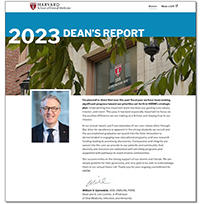
A distressed patient arrives at a dental clinic complaining of jaw pain and pleading for pain medication. The dentist suspects it might be temporomandibular joint disorder (TMJ), but closer examination reveals years of neglected dental disease, a history of substance abuse, and potentially a more serious condition that could be cancer.
The scenario is one that could happen in any dental clinic or doctor’s office, but this particular example is part of a detailed training module designed to educate health care professionals who have to make critical treatment decisions that often include prescribing opioid drugs.
The National Institutes of Health (NIH) recently awarded Harvard School of Dental Medicine (HSDM) and collaborators from other Boston health education institutions a 5-year $494,000 contract from the National Institute of Drug Addiction to create case-based training modules that will educate students and health care professionals in dentistry, medicine, nursing, and pharmacy about pain management and appropriate opioid prescribing.
Dr. Jeffry Shaefer, assistant professor of Oral and Maxillofacial Surgery, is principal investigator for the NIH contract along with co-principal investigator Dr. Antje Barreveld, an anesthesiologist with Newton Wellesley Hospital.
Shaefer, who has been teaching pain management for years at HSDM, brought together collaborators from Harvard Medical School, Massachusetts College of Pharmacy, Regis College of Nursing, MGH Institute of Health Professions, Brigham and Women’s Hospital (BWH) Pain Management Center and the BWH Department of Anesthesiology, Perioperative and Pain Medicine to apply for the funding. The NIH named Harvard School of Dental Medicine the lead institution in the Boston-based Center of Excellence in Pain Education (CoEPE) in 2012— it is one of eleven NIH CoEPEs nationwide.
“The most important thing we can do is teach proper pain management in schools,” Shaefer said. “The key is to not only teach the prescriber appropriate use of controlled pain medications but also an understanding of the patient’s disease process and how to properly evaluate the patient’s response to treatment,” he said.
Shaefer has already introduced the first training modules to third-year HSDM students and plans to use their feedback to refine future modules. The NIH award will also support inter-professional workshops that will bring dental, medical, nursing and pharmacy students together for pain management education. The modules have potential applications in continuing education courses as well. Eventually, the modules that the HSDM CoEPE creates, along with modules from the other 10 CoEPEs, will be available to the public on an NIH website.
These educational efforts come at a crucial time when prescription drug and heroin deaths make headlines on a daily basis. In October, Massachusetts Governor Charlie Baker proposed a bill that would limit practitioners to prescribing no more than a 72-hour supply of opioids to patients in most cases. His proposal is one of several steps the state is considering to address the problem.
Governor Baker also formed the Medical Education Working Group on Prescription Drug Misuse with deans from Massachusetts’ medical schools to examine medical education core competencies for the prevention and management of prescription drug misuse. The group’s recommendations for core competencies included skills in screening, evaluation and prevention; treating at-risk patients; and managing substance use disorders as chronic disease.
A joint response from the schools of dental medicine at Boston University, Harvard, and Tufts, supported the working group’s recommendations, “Given the significant role of dentistry in opioid prescribing, we strongly support the Core Curriculum Recommendations.” It went on to say, “Dentists are in a particularly unique position to have an impact, as they typically have regular contact with their patients and commonly address issues of preventive health and wellness in their oral health regimes.”
Dr. John Da Silva, associate professor of Restorative Dentistry and Biomaterials Sciences, and vice dean of HSDM, is part of the group reviewing dental core competencies. He stressed the importance of both the national and local efforts.
“Although pain management has been a part of the curriculum at HSDM for years, this is an opportunity to think critically about how we educate our students and prepare them for the challenges they will face in their own careers and practices; and how their actions have an impact,” Da Silva said.


